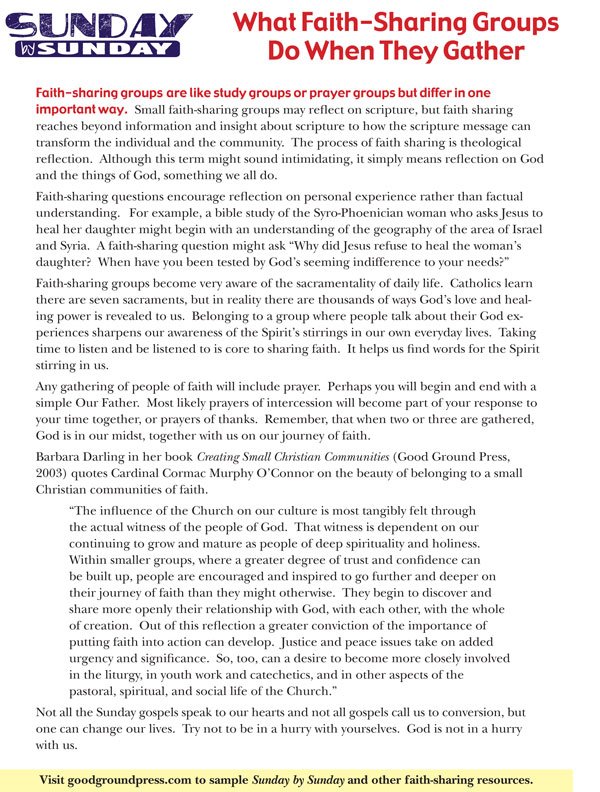Faith-sharing groups are like study groups or prayer groups but differ in one important way. Small faith-sharing groups may reflect on scripture, but faith sharing reaches beyond information and insight about scripture to how the scripture message can transform the indi- vidual and the community. The process of faith sharing is theological reflection. Although this term might sound intimidating, it simply means reflection on God and the things of God, something we all do.
Faith-sharing questions encourage reflection on personal experience rather than factual un- derstanding. For example, a bible study of the Syro-Phoenician woman who asks Jesus to heal her daughter might begin with an understanding of the geography of the area of Israel and Syria. A faith-sharing question might ask “Why did Jesus refuse to heal the woman’s daughter? When have you been tested by God’s seeming indifference to your needs?”
Faith-sharing groups become very aware of the sacramentality of daily life. Catholics learn there are seven sacraments, but in reality there are thousands of ways God’s love and healing power is revealed to us. Belonging to a group where people talk about their God experiences sharpens our awareness of the Spirit’s stirrings in our own everyday lives. Taking time to listen and be listened to is core to sharing faith. It helps us find words for the Spirit stirring in us.
Any gathering of people of faith will include prayer. Perhaps you will begin and end with a simple Our Father. Most likely prayers of intercession will become part of your response to your time together, or prayers of thanks. Remember, that when two or three are gathered, God is in our midst, together with us on our journey of faith.
Barbara Darling in her book Creating Small Christian Communities (Good Ground Press, 2003) quotes Cardinal Cormac Murphy O’Connor on the beauty of belonging to a small Christian communities of faith.
The influence of the Church on our culture is most tangibly felt through the actual witness of the people of God. That witness is dependent on our continuing to grow and mature as people of deep spirituality and holiness. Within smaller groups, where a greater degree of trust and confidence can be built up, people are encouraged and inspired to go further and deeper on their journey of faith than they might otherwise. They begin to discover and share more openly their relationship with God, with each other, with the whole of creation. Out of this reflection a greater conviction of the importance of putting faith into action can develop. Justice and peace issues take on added urgency and significance. So, too, can a desire to be- come more closely involved in the liturgy, in youth work and catechetics, and in other aspects of the pastoral, spiritual, and social life of the Church.
Cardinal Cormac Murphy O’Connor
Not all the Sunday gospels speak to our hearts and not all gospels call us to conversion, but one can change our lives. Try not to be in a hurry with yourselves. God is not in a hurry with us.
